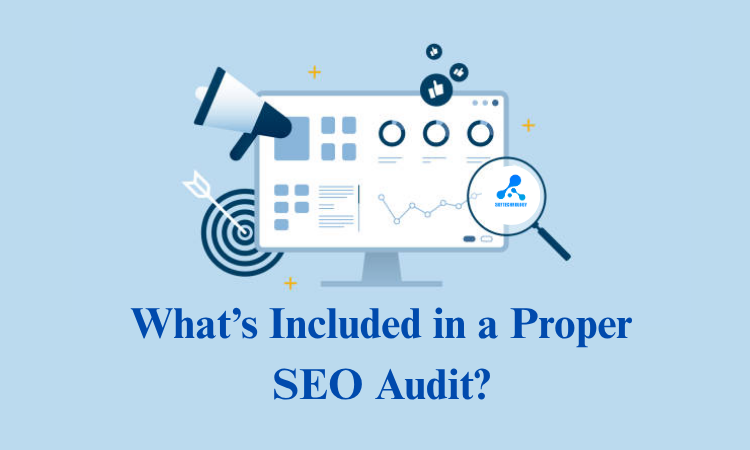Do you want to grow your traffic but are not sure where to start? An SEO audit is the first step to boosting your website’s visibility. Whether it’s a technical, content, or full-site audit, the process uncovers hidden issues blocking your growth.
This article breaks down what is an SEO audit is, explores SEO audit services, and shows exactly why your website needs an SEO audit before you spend a single dollar on ads.
The Purpose of an SEO Audit:
An SEO audit functions like a website health audit, scanning for hidden issues that hinder your traffic, such as slow speed, broken links, weak content, or a poor mobile experience. These invisible blockers quietly hurt your rankings.
An audit aligns your site with SEO best practices and ensures you meet Google’s quality standards for trust, authority, and content relevance.
One of the biggest benefits of an SEO audit is fixing problems before spending time or money on growth strategies, making your efforts more effective and measurable.
What’s Included in a Proper SEO Audit?
An effective SEO audit is more than just technical fixes. It covers your content quality, website structure, backlink health, and even your mobile experience. Let’s break it down into core parts.

Technical SEO Audit
This checks your site’s structure, crawlability, indexation, and any technical errors. It includes XML sitemaps, robots.txt, broken links, and page speed insights. A strong technical SEO foundation ensures search engines can properly access and rank your content without unnecessary roadblocks.
On-Page SEO Audit
Here, each page is evaluated for content optimization: titles, meta descriptions, header tags, and keyword placement. It ensures your pages align with user intent, avoid duplicate content, and follow best practices that help you rank higher organically.
Backlink Audit
Backlinks are like votes of trust. This audit inspects your link profile to identify toxic links, lost opportunities, and your overall domain authority. Quality backlinks boost rankings; bad ones trigger penalties. It’s essential to build trust and avoid SEO risks.
Content Audit
Your site’s content is scanned for freshness, accuracy, relevance, and performance. This process identifies thin content, outdated pages, and keyword gaps. Content optimization ensures every page serves a clear purpose and matches both search intent and Google’s E-E-A-T guidelines.
Local & Mobile Audit
Your audit should assess mobile-friendliness, responsive design, and site speed on phones. It also includes checks for local SEO like Google Business Profile, NAP consistency, and location-based keywords that are crucial if you serve local customers or rely on foot traffic.
Most Common Problems Found in SEO Audits:
These are the usual culprits holding websites back from ranking.
Indexing Problems
Search engines can’t rank what they can’t see. Indexing issues like blocked pages, noindex tags, or crawl errors often hide key content from Google, stopping you from gaining visibility.
Page Not Mobile-Friendly
A site that isn’t mobile-ready fails modern SEO standards. Mobile usability errors, poor layout, or slow loading on phones negatively impact rankings due to Google’s mobile-first indexing priorities.
Duplicate Content
Having duplicate content confuses search engines. It dilutes authority, causes internal competition, and may trigger ranking penalties. This usually comes from product pages, blog reuse, or poor URL structures.
Thin Content
Low-value or thin content lacks depth and relevance. Pages with too little useful information struggle to rank and offer a poor user experience. These need either enrichment or removal altogether.
Spammy Backlinks
Toxic links from shady sites are a red flag. Common backlink audit signs include sudden spikes, irrelevant sources, or link networks, all of which can trigger search engine penalties.
How does an SEO Audit Directly Impact Rankings?
An SEO audit isn’t just about ticking boxes; it’s about unlocking your site’s true potential. When you identify and fix crawl errors, you’re making it easier for search engines to access and understand your pages. That boosts organic visibility, meaning your site shows up more often and higher in search results.
Audits also reveal gaps in site performance, like slow load times or poor mobile experience. Once fixed, these improvements lead to better user flow, higher engagement, and lower bounce rates. Google notices these behavior signals and rewards them.
From better content structure to stronger technical foundations, an SEO audit sets the stage for long-term success. As a result, you don’t just look better to algorithms, and you create a smoother journey for your visitors. And when users are happy, your rankings improve.
Who Needs an SEO Audit?
Whether you’re a small business, a blogger, or run an eCommerce store, an SEO audit is essential. A local SEO audit helps neighborhood businesses get found, while a full audit gives new websites the best possible start.
Audits are also a must after major redesigns or sudden traffic drops. They catch issues before they snowball and help you bounce back fast.
Experts recommend checking your site regularly at least once or twice a year. That’s smart SEO audit frequency. It ensures your strategy stays aligned with Google’s evolving standards and your audience’s behavior.
Manual vs Automated SEO Audits: Which Is Better?
Automated SEO audits are fast and budget-friendly. Tools like Screaming Frog or Semrush scan your site in minutes, flagging obvious issues. But they often miss context, intent, and deeper content flaws.
Manual audits, on the other hand, involve a real expert digging into your site’s structure, backlinks, and on-page content. They’re more accurate but take time and cost more.
So, what’s right for you? It depends on your goals. If accuracy matters most, go manual. When choosing an SEO provider, ask about their approach and clarify SEO audit pricing upfront.
Top SEO Audit Tools: A Quick Guide
Five powerful tools to help uncover and fix SEO issues.

Google Search Console (Free)
Google’s own tool highlights crawl errors, indexing issues, and page experience. Perfect for beginners and pros. SEO audit tools don’t get more essential than this one. Learn more about Google search console.
SEMrush (Paid)
SEMrush offers in-depth site audits, backlink analysis, and keyword tracking. It’s user-friendly, with color-coded reports ideal for spotting issues fast. Great for agencies and long-term SEO tracking.
Ahrefs (Paid)
It is known for its backlink audits and content analysis. Ahrefs also detects technical errors. Clean dashboard and easy navigation make it a favorite for advanced users.
Screaming Frog (Free + Paid)
This desktop crawler scans every page for technical SEO issues. The free version covers basics, while the paid version unlocks powerful advanced insights like JavaScript rendering and broken redirects.
Ubersuggest (Free + Paid)
It is a budget-friendly tool for SEO audits, content ideas, and traffic insights. Simpler than others, but useful for freelancers, bloggers, and small businesses aiming to improve rankings.
Post-Audit Action Plan: What to Do Next?
Start by reviewing your SEO audit checklist and prioritizing high-impact issues like crawl errors or mobile-friendliness.
Then, create a clear SEO audit roadmap and split it into technical and content fixes.
Use content gap analysis to plan new or improved pages.
Tackle quick wins first, then schedule long-term improvements.
Regularly revisit this roadmap to track results and adjust strategy based on ongoing performance.
How to Read an SEO Audit Report?
Your SEO audit report highlights key audit deliverables like crawl status, error breakdowns, and backlink data. Focus on your site health score, index coverage, and toxic links.
Don’t get lost in jargon; each metric shows where to improve and how healthy your site really is, step by step.
How Often Should You Audit Your Website?
A quarterly SEO audit, every 3 to 6 months, is ideal for maintaining site health. Increase audit frequency after a major update, redesign, or sudden traffic drop.
A consistent SEO audit cadence helps catch issues early, keeping your performance strong and aligned with Google’s evolving expectations.
Final Advice: Make SEO Audits a Habit
Think of SEO audits as a routine health check for your website. They ensure consistent growth, improved visibility, and top-notch website SEO performance. Follow best practices for SEO audit regularly to stay ahead of competitors.
If you’re ready to boost your rankings, Sky Technology offers expert SEO services , health checks and full audits at a reasonable budget.
Start your journey toward better visibility today. Contact us now!





